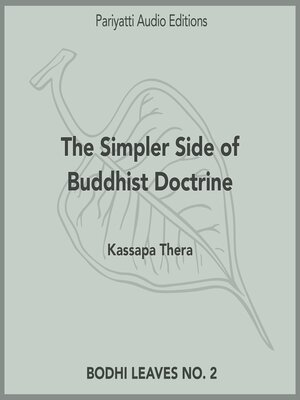
Sign up to save your library
With an OverDrive account, you can save your favorite libraries for at-a-glance information about availability. Find out more about OverDrive accounts.
Find this title in Libby, the library reading app by OverDrive.



Search for a digital library with this title
Title found at these libraries:
| Library Name | Distance |
|---|---|
| Loading... |
This is an audiobook of Bodhi Leaves No. 2 by Kassapa Thera, The Simpler Side of Buddhist Doctrine narrated by Jim Swift. The print edition can be found in the Pariyatti Edition of Collected Bodhi Leaves Vol. 1. The eBook of Bodhi Leaves No. 2 can be downloaded from the BPS website.
Excerpt:
In the Holy Books are many sermons, long and short, full of advice to the average layman. Notable amongst these is the Sigālovāda Suttanta, known as "the Layman's Vinaya" which details correct behaviour for the good layman. Excellent though all such sermons are, none can surpass the brief simple appeal of the words to Nakula's parents, which advise the cultivation of four things: Saddhā, Virtue, Generosity and Wisdom.
A striking thing in the Buddha-dhamma is that here we find naught of "Thou shalt" or "Thou shalt not." When once it is realized that selfishness and self-indulgence cause all our woe, then a wise one strives for self mastery. Sīla is the mastery of speech and action. Of his own free will, the Buddhist "pledges to observe" this precept of virtue, and that. The minimum number of such precepts of virtue that the good Buddhist should observe is five: (1) I undertake to observe the precept to abstain from destroying the life of beings; (2) from taking things not given; (3) from sexual misconduct; (4) from false speech, and (5) from liquor that causes intoxication and heedlessness.
The Buddhist has no impossible postulates; he tries to see, as his teacher taught, "things as they really are." He looks at the world around him and sees that all, all is transitory there. He sees that what is transitory is bound to be sad. All that we love is passing away, and such parting from the loved is suffering. ..."







